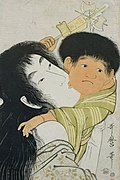Inoue Enryō
| Inoue Enryō | |
|---|---|
 | |
| Lahir | 18 Maret 1858 Distirk Santō, Nagaoka, Jepang |
| Meninggal | 6 Juni 1919 (umur 61) Dalian, Tiongkok |
| Nama lain | 井上 圓了 |
| Pekerjaan | filsuf dan guru |
Inoue Enryō (井上 円了, 18 Maret 1858 — 6 Juni 1919) adalah seorang royalis, guru, reformator, dan filsuf Jepang. Ia dikenal sebagai tokoh asal Jepang yang berusaha menafsirkan kembali konsep Buddhis sebagai alternatif yang dapat diterima secara intelektual dari doktrin filosofi Barat.[1]
Biografi[sunting | sunting sumber]
Setelah tamat dari sekolah untuk pendeta di Higashihongan-ji, kuil utama Jōdo-Shinsh, ia melanjutkan ke Universitas Imperial Tokyo dan lulus dari fakultas filsafat pada tahun 1885. Inoue Enryō menganggap budaya westernisasi terlalu berlebihan di Jepang, terutama dari tokoh-tokoh pemimpin di pemerintahan yang kemudian banyak pindah ke agama Kristen. Oleh sebab itu, pada tahun 1887 ia mendirikan Institut Filsafat (Tetsugaku kan) untuk mempromosikan kembali agama Buddha. Inoue Enryō meyakini bahwa Buddhisme melambangkan filsafat oriental. Ia kemudian memperoleh banyak pengikut dan dengan bantuan mereka, Inoue mulai menerbitkan majalah nasionalis Nihonjin serta memulai serangkaian tur ceramah ke seluruh Jepang dan Eropa.[1]
Di kemudian hari, Inoue melakukan kampanye pendidikan untuk mengatasi takhayul yang terinspirasi oleh interpretasi cerita rakyat Jepang. Ia juga mendirikan Institut Pengetahuan Hantu di Tokyo dan mendapat julukan "Dokter Obake" atau "Dokter Hantu."[1]
Inoue Enryō meninggal dalam perjalanan ketika melakukan tur ceramah di Manchuaria.[1]
Pekerjaan[sunting | sunting sumber]
Di bawah ini merupakan daftar monograf karya Inoue Enryō, dan tidak termasuk buku harian perjalanan, catatan kuliah, syair dan kata-kata mutiara dalam bahasa Mandarin, buku teks, artikel, serta kumpulan esai. Karya-karyanya yang terdaftar dapat diakses melalui Basis Data Penelitian Inoue Enryō
- 1886/87 Epitome of Philosophy『哲学要領』(2 jilid)
- 1886/87 An Evening of Philosophical Conversation『哲学一夕話』(3 jilid)
- 1886/87 The Golden Compass of Truth『真理金針』(3 jilid)
- 1887 Dark Tales of Mysteries『妖怪玄談』
- 1887 Prolegomena to a Living Discourse on Buddhism『仏教活論序論』
- 1887 Living Discourse on Buddhism: Refuting the False『仏教活論本論:破邪活論』
- 1887 Fundamentals of Psychology『心理摘要』
- 1887 Outline of Ethics『倫理通論』(2 jilid)
- 1888 A New Theory of Religion『宗教新論』
- 1889 Treatise on Religion and the State in Japan『日本政教論』
- 1890 Living Discourse on Buddhism: Disclosing the Right『仏教活論本論:顕正活論』
- 1890 Imaginary Interstellar Travelogue『星界想遊記』
- 1891 Fundamentals of Ethics『倫理摘要』
- 1891 A Morning of Philosophical Conversation『哲学一朝話』
- 1892 Prolegomena to a Philosophy of the True School『真宗哲学序論』
- 1893 Living Discourse on Loyalty and Filial Piety『忠孝活論』
- 1893 Discussing the Relationship between Education and Religion『教育宗教関係論』
- 1893 Proposal in Japanese Ethics『日本倫理学案』
- 1893 Prolegomena to a Philosophy of the Zen School『禅宗哲学序論』
- 1893/94 Lectures on Mystery Studies『妖怪学講義』
- 1894 Fragment of a Philosophy of War『戦争哲学一斑』
- 1895 Prolegomena to a Philosophy of the Nichiren School『日宗哲学序論』
- 1897 The Heterodox Philosophy『外道哲学』
- 1898 Outline of Indian Philosophy『印度哲学綱要』
- 1898 The Pedagogical View of Life and the World: or, Theory of the Educator's Mental Peace『教育的世界観及人生観:一名教育家安心論』
- 1898 Refuting Materialism『破唯物論』
- 1898/1900 One Hundred Mysterious Stories『妖怪百談』(2 jilid)
- 1899 Theory of the Immortality of the Soul『霊魂不滅論』
- 1899 A Quick Primer to Philosophy『哲学早わかり』
- 1901 Philosophical Soothsaying『哲学うらない』
- 1902 The Hidden Meaning of the Rescript『勅語玄義』
- 1902 Proposal for the Reform of Religion『宗教改革案』
- 1903 Goblin-Theory『天狗論』
- 1904 The Dissolution of Superstition『迷信解』
- 1904 Psychotherapy『心理療法』
- 1904 Dream of New Reform Devices『改良新案の夢』
- 1909 New Proposal in Philosophy『哲学新案』
- 1912 Japanese Buddhism『日本仏教』
- 1912 Living Buddhism『活仏教』
- 1913 A Glance at the World of Philosophy『哲界一瞥』
- 1914 The True Nature of Specters『お化けの正体』
- 1914 Life is a Battlefield『人生是れ戦場』
- 1916 Superstition and Religion『迷信と宗教』
- 1917 Philosophy of Struggle『奮闘哲学』
- 1919 The True Mystery『真怪』
Referensi[sunting | sunting sumber]
- ^ a b c d "Inoue Enryō | Japanese philosopher | Britannica". www.britannica.com (dalam bahasa Inggris). Diakses tanggal 2022-07-15.
Bacaan lanjut[sunting | sunting sumber]
- Bodiford, William. "Inoue Enryo in Retirement: Philosophy as Spiritual Cultivation," International Inoue Enryo Research 2 (2014): 19‒54. [1]
- Figal, Gerald. Civilization and Monsters: Spirits of Modernity in Meiji Japan (Duke University Press, 1999).
- Foster, Michael D. Pandemonium and Parade: Japanese Monsters and the Culture of Yōkai (University of California Press, 2008).
- Foster, Michael D. The Book of Yokai: Mysterious Creatures of Japanese Folklore (University of California Press, 2015).
- Godart, Gerard R. Clinton. "Tracing the Circle of Truth: Inoue Enryo on the History of Philosophy and Buddhism," The Eastern Buddhist 36 (2004): 106‒133.
- Josephson, Jason Ā. "When Buddhism became a «Religion»: Religion and Superstition in the Writings of Inoue Enryō," Japanese Journal of Religious Studies 33 (2006): 143‒168. [2]
- Miura Setsuo 三浦節夫. "Inoue Enryo's Mystery Studies," International Inoue Enryo Research 2 (2014): 119‒154. [3]
- Toyo University, pub. The Educational Principles of Enryo Inoue ([Jap. 1987] 2012).
- Schrimpf, Monika. "Buddhism Meets Christianity: Inoue Enryō's View of Christianity in Shinri Kinshin," Japanese Religions 24 (1999): 51‒72.
- Schulzer, Rainer. "Inoue Enryo Research at Toyo University," International Inoue Enryo Research 2 (2014): 1-18. [4]
- Schulzer, Rainer. Inoue Enryo: A Philosophical Portrait (SUNY Press, 2019).
- Schulzer, Rainer, ed. Guide to the Temple Garden of Philosophy (Toyo University Press, 2019). ISBN 978-4-908590-07-8
- Staggs, Kathleen M. "«Defend the Nation and Love the Truth»: Inoue Enryo and the Revival of Meiji Buddhism," Monumenta Nipponica 38 (1983): 251‒281.
- Takemura Makio 竹村牧男. "On the Philosophy of Inoue Enryo," International Inoue Enryo Research 1 (2013): 3-24. [5]

